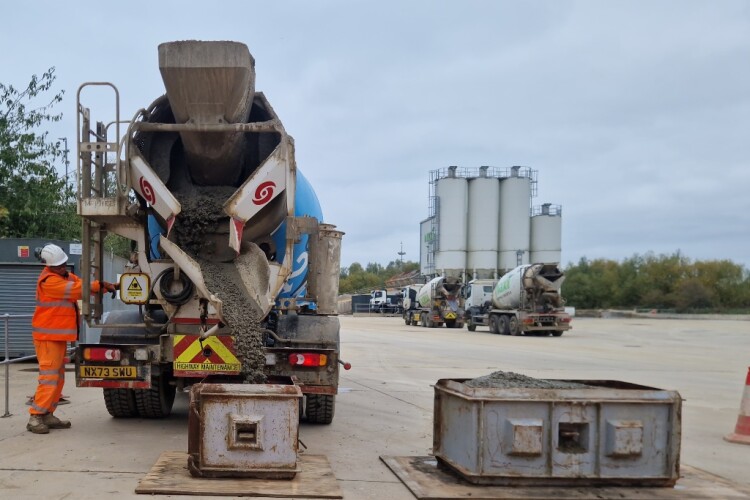This post was originally published on this site
https://www.theconstructionindex.co.uk/assets/news_articles/2025/11/1763106719_rcf-1.jpgConcrete fines have traditional been regarded as a waste product but putting them back into the mix, and thus reduce embedded carbon, has now been shown to work.
The cross-industry trial, funded by Innovate UK and led by the Materials Processing Institute (MPI), forms part of UK Research and Innovation’s (UKRI) ‘Contracts for Innovation: Decarbonising Concrete’ programme.
Beginning in September 2024 and concluding in December 2025, the project brings together industry bodies, engineers and researchers to develop a cement containing recycled concrete fines (RCF) as a lower-carbon alternative to Portland cement.
Along with cement producer Holcim UK and lead partner MPI, participants include Mott MacDonald, the Minerals Products Association and Aston University. In October, the trial culminated in a successful demonstration batch of readymix concrete using RCF-based cement being poured into moulds at Holcim UK’s readymix concrete plant in Whetstone, Leicestershire.
RCF, a waste product from demolished buildings, serves to replace clinker in Portland cement (PC), which is classified as a CEM I formulation. The demonstration showed the feasibility of using RCF as a raw material in CEM II cement, replacing approximately 20% of clinker. Clinker is the most carbon-intensive element of cement production, as the raw material must be heated to high temperatures to form the material. By reducing the clinker in cement blended products, the overall product carbon footprint is reduced.
Holcim UK technical innovation manager Danielle Dawson explained: “Recycled concrete fines, which are currently treated as a demolition waste stream, can be processed to partially replace clinker, the most carbon-intensive component in cement manufacturing. The demonstration showed that RCF could replace approximately 20% of clinker in a CEM II cement formulation without compromising production feasibility. Clinker production is responsible for the majority of emissions in cement due to the high-temperature calcination process required to form it.”


She added: “The success of this trial means we are well on the way to having another viable replacement to PC on the market soon, ready for future construction projects. The next stage is to undergo further testing and certification, before this CEM II-classified product can then be written into the revised British Standards for concrete, BS 8500.”
RCF is currently permitted in cement under EN 197-6, but not yet harmonised with BS 8500 for ready-mix applications. The next revision of BS 8500 is due in 2027.
While testing is ongoing, Holcim UK is accelerating its plans to scale this innovation. Plans are already in place to source RCFs from its waste management partner. This waste stream will then be put back into future production at its new cement plant in Tilbury, which is currently under construction and will look to be operational from late 2026.
Working with Danielle Dawson on the cement formula was cement engineer Roger Griffiths from the Mineral Products Association. He said: “This trial is a powerful example of industry collaboration that drives true innovation. We’re grateful to Danielle for her invaluable technical input, and the team at Holcim UK’s Whetstone plant for bringing this project to life with the demonstration. This work will unlock new pathways to sustainable construction for the UK and it is great to see Holcim is preparing to scale this innovation at pace once it is accepted on the standards.”
Got a story? Email [email protected]


